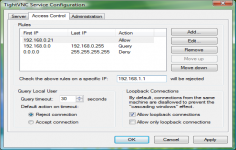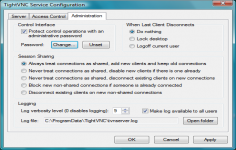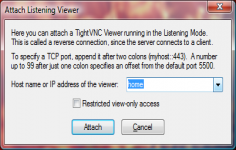 TightVNC 2.0 Beta 2
TightVNC 2.0 Beta 2
TightVNC - (Open Source)
TightVNC allows to remotely control a computer via Internet making it very easy to take care of a computer maintenance.
TightVNC is a program for remote control and administration via the Internet on a computer no matter what kind of operating system is installed.
The software allows to see in real time all this happens on controlled computer as if user is sitting at its computers. Besides monitoring, TightVNC is also able to optimize bandwidth. TightVNC is a free software compatible with the standard VNC.
This software is also very useful for making a remote computer maintenance.
- Title:
- TightVNC 2.0 Beta 2
- File Size:
- 634.2 KB
- Requirements:
- Windows (All Versions)
- Language:
- en-us
- License:
- Open Source
- Date Added:
- 07 Apr 2010
- Publisher:
- TightVNC
- Homepage:
- http://www.tightvnc.com
- MD5 Checksum:
- 2682CF98138D1BCEB21FF703A9B1A941
* Installer: Valid digital signatures have been added to the installer and installed TightVNC executable files.
* Installer: Featuring new option to add exceptions for TightVNC Server and Viewer to Windows Firewall (supported in Windows XP SP2 or any later version of Windows).
* Installer: Featuring new option to enable system services simulate well-known Ctrl-Alt-Del keyboard combination under Windows Vista and above.
* Installer: The service configuration page (where initial passwords can be set) has become completely optional. And that page will not be auto-selected if the passwords have been set already.
* Installer: An issue with file sharing failure has been fixed - it could be experienced after trying to set both passwords via the service configuration page. Also, there were potential problems with not actually enabling authentication on setting passwords from the installer - they have been fixed as well.
* Installer: There was a number of other minor changes such as user interface enhancements and improvements to the installation logic.
* Server for Windows: Keyboard handling has been fixed. Previous Beta version could handle combinations like Ctrl-C or Ctrl-V incorrectly - it could insert literal C or V instead. New version fixes that - it should interpret keyboard modifiers properly. In addition, it fully supports Windows and Menu keys. Finally, sending Ctrl-Alt-Del remotely should work on all supported versions of Windows.
* Server for Windows: Authentication subsystem has been improved - now it would prevent brute-force attacks on passwords by introducing delays after failed authentication attempts. This works for both RFB connections and for administrative passwords. Another authentication-related fix eliminates erroneous authentication requests on reverse connections.
* Server for Windows: Tight encoder has been fixed - it could work incorrectly in previous Beta version. It did not preserve the state of its data stream in situations when it was disabled and then re-enabled by the viewer. As a result, the viewer could not decode compressed data and had to disconnect. Corrected code accurately preserves the state of each encoder to eliminate such protocol synchronization problems.
* Server for Windows: Clipboard handling has been recovered. Clipboard transfers could fail in either direction due to text format translation problems - resolved now.
* Server for Windows: Mouse position tracking over multiple monitors has been fixed. Previously, coordinates of the mouse cursor could be calculated incorrectly if the primary monitor was not the leftmost and topmost one within a composite desktop.
* Server for Windows: New version sends viewers descriptive error messages if it must close their connections in the very beginning of the session. For example, if the server does not allow "loopback" connections, the viewer will report that fact. Similarly, the viewer should report other errors like protocol version mismatch or rejects caused by repetitive authentication failures.
* Server for Windows: Several useful command-line options have been re-implemented: -connect, -disconnectall, -reload and -shutdown (they must be preceded with either -controlservice or -controlapp in the command line). Similar options (with slightly different names) were supported by TightVNC 1.x, but there were no counterparts available in TightVNC 2.0 Beta 1.
* Server for Windows: Compatibility with other software has been improved. In particular, palette-based pixel formats are now properly supported. TightVNC Viewer never requests indexed colors, but other RFB-compliant software may do that. Previous version of the TightVNC Server could calculate palette colors incorrectly, effectively converting all colors to black. That issue has been resolved.
* Server for Windows: In TightVNC file transfer protocol, file modification timestamps are represented in milliseconds. However, previous version erroneously decreased precision and actually operated with pure seconds. That has been fixed.
* Server for Windows: There was a number of other improvements, including architectural adjustments, additional logging, fixes for real and potential memory leaks, code cleanups, and so on.
* Viewer for Windows: A bug with registering .vnc file extension has been fixed. The viewer wrote incorrect command line to the registry and then could not restore connections saved in .vnc files.
* Viewer for Windows: Keyboard handling has been improved. New version is able to send Windows and Menu keys over the RFB protocol.
* Viewer for Windows: File modification time format has been corrected in file transfer panels. Timestamps were formatted in UTC for some reason, but now they should show up in local time zone.
* Viewer for Windows: "Local cursor shape" setting has been recovered. Now it should take immediate effect on pressing the Ok button in the Connection Options window. In addition, pressing that Ok button would not hide remote cursor - that was another bug fixed in this version.
* Viewer for Windows: TightVNC Viewer could write repetitive entries to the connection history and it could create meaningless directories in the registry when parsing its command line.
* Other minor improvements and fixes have been made.
Related software
2.1/5 from 177 users


